(Contractual) Longevity of Conductors
Upon hearing news of Simon Rattle's contract as principal conductor being extended by the self-governing Berlin Philharmonic through 2018, I put together a quick — and obviously incomplete — survey of music directors' tenure.
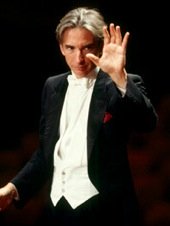
(Nothing ever will equal Pierre Monteux's London Symphony Orchestra contract of 25 years beginning at age 86, an offer he accepted only on condition of a 25-year option of renewal.)
- Marin Alsop, Baltimore Symphony: 2015
- Michael Christie, Phoenix Symphony: 2015
- Gustavo Dudamel, Los Angeles Philharmonic: 2014
- Charles Dutoit, Philadelphia Orchestra: 2012 *
- Thierry Fischer, Utah Symphony: 2013
- Alan Gilbert, New York Philharmonic: 2013
- Hans Graf, Houston Symphony: 2013
- Manfred Honeck, Pittsburgh Symphony: 2016
- Paavo Jarvi, Cincinnati Symphony: 2011 **
- Graeme Jenkins, Dallas Opera: 2011
- James Levine, Metropolitan Opera: 2011; Boston Symphony: 2010
- Yahja Ling, San Diego Symphony: 2012
- Nicola Luisotti, San Francisco Opera: 2014
- Nicholas McGegan, Philharmonia Baroque: 2016
- Michael Morgan, Oakland East Bay Symphony: Dates unavailable, Sacramento Philharmonic: 2011
- Riccardo Muti, Chicago Symphony: 2016
- Kent Nagano, Montreal Symphony: 2011; Bavarian State Opera: 2011
- Alasdair Neale, Marin Symphony: Dates unavailable
- Seiji Ozawa, Vienna State Opera: 2010
- Donald Runnicles: BBC Scottish Symphony: 2012; Deutsche Oper Berlin: 2014; Grand Teton Music Festival: 2011
- Gerard Schwarz, Seattle Symphony: 2011
- Robert Spano, Atlanta Symphony: 2014
- Michael Tilson Thomas, San Francisco Symphony: 2012 ***
- Osmo Vanska, Minnesota Orchestra: 2015
- Franz Welser-Most, Cleveland Orchestra: 2018
- Jaap van Zweden, Dallas Symphony: 2016
** "Evergreen contract, automatically renewed each season by mutual agreement"
*** "An evergreen contract, renewed on a regular basis by mutual agreement"
Maninger: Cellist, Chocoholic, Media Pioneer
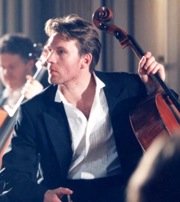
When you attend the Berlin Philharmonic's Nov. 20 and 21 concerts at Davies Symphony Hall, keep your eye on the principal cellist. That's Olaf Maninger, originator and manager of the orchestra's spectacular Digital Concert Hall, a generic name co-opted by the Berliners.
DCH is a web-based high-quality video service, which telecasts live concerts from the orchestra's famed hall in Berlin, and offers past programs from its large and growing archive.
Conceived four years ago — when Web casts were in their infancy — and making its debut in January, DCH is Maninger's responsibility.
Preparing for the U.S. tour (and anticipating his and the orchestra's return to "breathtakingly beautiful San Francisco and the luckiest people on the planet to have the Ghirardelli chocolate factory"), Maninger spoke from Berlin about the genesis of the Digital Concert Hall:
For a number of years I have represented the interests of my colleagues as a member of the orchestra’s Media Board. I was continuously thinking about how we could better connect with our worldwide audience. Transmitting concerts online seemed like a very good step – transmitting them live seemed even more promising.The great thing about this orchestra is that we decide everything jointly, so we discussed the concept for a long time – it felt audacious to enter this adventure as the first orchestra worldwide. But we felt up for it and went for it.
And for me personally, our concert in Taipei in 2005 was a crucial moment. The concert was transmitted on a big screen in front of the concert hall and more than 30,000 people came to watch us – it was overwhelming. I just thought: There must be a way of connecting with our worldwide fans more regularly.
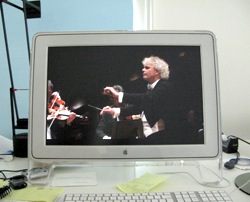
The Philharmonic is the world's largest self-governing orchestra. Ask Maninger what it is like for musicians to run the orchestra themselves, and he'll tell you: "Only a member of the orchestra would understand what kind of managerial decisions could make sense for the orchestra." Take that, musical organizations run from the top down!
The Philharmonic does have an administration, headed by former San Francisco Opera General Director Pamela Rosenberg, who is retiring in a few months. Rattle's contract has just been extended through 2018; his 16 years with the orchestra will make him a distant second to Herbert von Karajan's tenure, 1954-1989. As for Rattle, he is a big supporter of the Digital Concert Hall:
When the players first started talking about the idea, it was to me just completely obvious that this was going to be the future. We’ve all been thinking over these last years: How will people want to receive art in their own houses? And we more and more thought that it was people just expecting this to be there — like water.There will be all types of different art forms, films, you name it, going into people’s houses. And we should be able to give them the experience of our music as well.People want to be part of these live events. And if you can’t be there, the idea that you can plug into something that is happening in real time is very important.
Also I can’t stress enough how different this particular orchestra is, because, when people can see the orchestra, they see this very extraordinary physical connection that they have with their instruments, how they move. And when it works really well, it can work like waves in an ocean, this kind of amazing organic motion which one sees in very, very few places.
Ensemble Parallèle's Novel Wozzeck
San Francisco Conservatory-resident Ensemble Parallèle will stage Alban Berg's Wozzeck in a new orchestration at the Yerba Buena Center for the Arts, on Jan. 30-31.
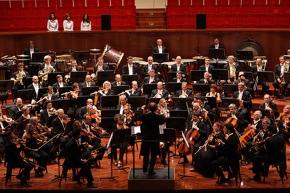
Rather than using the original version, which requires an orchestra that wouldn't fit into Yerba Buena's limited space, Nicole Paiement will conduct a chamber-opera arrangement by John Rea in a West Coast premiere.
Berg requires nearly 100 instruments, including about 60 strings, quadruple wind, quadruple brass, tuba, two pairs of timpani, piles of percussion including xylophone and celesta, harp, onstage music including a military band, side drums, a little tavern combo (two mistuned violins, clarinet, accordion, guitar, bombardon, or tuba), and an upright piano. Also a group of 15 players "if possible extra and separated from the main orchestra."
Montreal composer Rea, on the other hand, has concluded that no fewer than 21 musicians were required to render the music vital and irresistible ...
At the center of the project, however, was a surprising paradox: The notion of reduction meant stretching out — in fact, it demanded genuine enlargement! How so? By demanding a very intense type of work from every member of the chamber orchestra, asking them to play more frequently than in the original score, and to interpret musical parts that often do not "belong" to them.So, an orchestra reduced to a quarter of the size of Berg's and yet "enlarged." Should be interesting.Though I was not afflicted by any enchanting "idée fixe," or aberatio mentalis partialis, zweite Spezies, as the Doctor says to Wozzeck, nevertheless, transforming Berg's multicolored score was painful. I must admit that, occasionally, I was even subject to dizzy spells.
The production will be stage directed by Brian Staufenbiel, with lighting and set designer Matthew Antaky. Media artist Austin Forbord is responsible for "projections of stark expressionist images inspired by German silent films of the Weimar Republic in the 1920s."
In the cast: tenor John Duykers as the Captain and bass-baritone Bojan Knezevic as Wozzeck; mezzo-soprano Patricia Green as Marie, tenor AJ Glueckert as the Drum Major, tenor J. Raymond Meyers as Andreas, and bass Philip Skinner as the Doctor.
Yuja, Shanghai Symphony in Berkeley
Yuja Wang is the soloist in the Rachmaninov Piano Concerto No. 2 (a pairing recently heard at Davies Symphony Hall) when the Shanghai Symphony, Asia's oldest orchestra, visits Zellerbach Hall on Nov. 22.
The concert will be the last stop on the orchestra's U.S. tour celebrating its 130th anniversary. Conducted by Music Director Long Yu, the program also includes the Prelude to Mussorgsky's Khovantchina, and Qigang Chen's Iris Dévoilée (Iris unveiled).
'The Future Is Now' and Looking Good
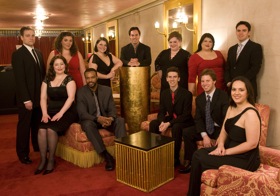
In the beginning — that would be 1954 — San Francisco Opera's legendary general director, Kurt Herbert Adler, created the Merola Program. Named for company founder Gaetano Merola, the program has acted for over half a century as a hothouse of young talent.
Then, in 1977, the Affiliate Artists Program was added, a kind of graduate school for the best of Merolini, bridging the gap between preparing for and actually beginning an operatic career. In 1982, a year after Adler's death, his successor, General Director Terence McEwen named participants in the program the Adler Fellows.
Many of these young artists have become world-renowned stars. Even so, there have been few groups of Adler Fellows as potent as this year. They have all been seen and heard in the Opera's mainstage productions and they have significant future engagements here and elsewhere.
On Sunday, the Adler Fellows will conclude the year by performing The Future Is Now, an evening of arias and duets at Herbst Theatre.
Calling the concert "the culmination of our efforts," soprano Leah Crocetto says, "We all have something to offer, and it is a blessing indeed that we have this opportunity to put our gifts on display to show exactly what makes us unique and special."
Facing the concert without trepidation, tenor Alek Shrader says, "After all the hard work and preparation as an Adler Fellow, it becomes very easy to be fearless."
The event features a full orchestra, under the direction of Mark Morash, who is also responsible for putting the program together:
This year's concert should be a special treat for the bel canto audience. Each Adler will be featured in a selection by Verdi, Donizetti, or Rossini. It promises to be a great evening for great singing by some of the most beautiful voices emerging in the opera world today.On top of the talent paraded for the occasion, the program is unusual in featuring some rarities in addition to the customary warhorses. For example, there are selections from Gonoud's Sappho (instead of Faust), and Donizetti's Rita and Lucrezia Borgia (in addition to Lucia di Lammermoor).
Besides Crocetto and Shrader, the concert features soprano Tamara Wapinsky; mezzo-sopranos Daveda Karanas, Daniela Mack, and Renée Tatum; tenors Andrew Bidlack and David Lomelí; baritone Austin Kness, and bass Kenneth Kellogg.
Soprano Heidi Melton will miss the event because she has a Metropolitan Opera engagement — for her, "the future is now," indeed.
Award to Berkeley Symphony's Frank
Berkeley Symphony Creative Advisor Gabriela Lena Frank was awarded a Latin Grammy for "Best Classical Contemporary Composition" for her Inca Dances. Written in 2008, the work is scored for guitar and string quartet. In Frank's description "The two movements of this work each draw inspiration from a practice of remembering past kings through song and dance during the time of the ancient Inca empire."
Frank's Peregrinos received its West Coast premiere last month at Zellerbach Hall, under the direction of Berkeley Symphony Music Director Joana Carneiro in her inaugural concert.
Inca Dances was recorded along with works by Michael Daugherty, Roberto Sierra, and Aaron Jay Kernis on the CD Sound of the Americas with guitarist Manuel Barrueco and Cuarteto Latinoamericano. Frank begins a three-year residency with the San Francisco Chamber Orchestra as composer in residence this season. Her newly commissioned violin concerto, written for SFCO Concertmaster Robin Sharp, will premiere in May 2010.
An 'Opera Film' Like No Other

Some movies about opera singers have good musical performances, some don't. What they all have in common is a brain-damaged script. Beautiful, talented people struggling and succeeding. Yawn.
As Tolstoy might have said about the genre: "All happy opera singers are alike ... and there are no unhappy ones."
Then there is Wang Cailing, a voice teacher of Western music with an impressive voice of her own and burning ambition to become a star in Beijing's National Opera House. Unlike "Giorgio" Pavarotti and his cure by Kathryn Harrold, or swashbuckling Mario Lanza, Wang is dirt poor, has health problems, acne, and a personality that ranges from unpredictable to brutish.
This opera film about real people in the real world is And the Spring Comes (Lìchun) by Changwei Gu, with Wenli Jiang (the director's wife) in the lead role. She gives an unforgettable, Giuletta Masina-type performance, which won her Best Actress Award at the 2007 Rome Film Festival. Changwei, an outstanding cinematographer formerly for Zhang Yimou, Chen Kaige, and Robert Altman, made his debut as director with Peacock.
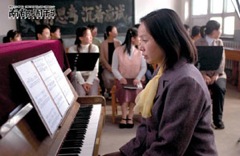 The two-year-old Spring is just making its U.S. premiere, at the San Francisco Chinese American Film Festival, and it's scheduled to be screened again at the 4-Star Theater, Nov. 20 and 21.
The two-year-old Spring is just making its U.S. premiere, at the San Francisco Chinese American Film Festival, and it's scheduled to be screened again at the 4-Star Theater, Nov. 20 and 21. If the story focused on the singer alone, it would be an excellent work, but there is a cast of amazing characters from Wang's parents and neighbors to a painter aspiring to be China's van Gogh (in painting and self-mutilation), to a young cancer patient (she says) who must sing lieder on Beijing television before she dies, to a cheerful gay ballet dancer defying the evidence of his age ... and much, much more.
Elixir of Sacramento
Sacramento Opera presents Donizetti's The Elixir of Love at the Sacramento Community Center Theater, Nov. 20-24, conducted by Timm Rolek, and directed by José Maria Condemi.The cast features Katrina Thurman as Adina, Dinyar Vania as Nemorino, Igor Vieria as Dulcamara, David Small as Belcore, and Carrie Hennessey as Gianetta.
Recomposing/Reconstructing Music
What of the music running around in your head?
"Oh the power of the subconscious!" Bernstein once exclaimed, talking about the Aida ballet haunting him while preparing a Norton Lecture about Stravinsky's Oedipus Rex. He then went on to link the two works convincingly.
Is it just Bernstein or is there some kind of logic driving the music we hum or just "think"?
Leaving Dido and hearing snippets from King Arthur can be explained, but far more common is the response to a musical experience of something seemingly unconnected.
Then there is the business of repetition and an interesting upshot in this context:
In the beginning, the initial acquaintance with Otello, of course, results in singing "Esultate!" in the shower, but way down the road — just last week — what kept running in my head nonstop after the performance were brief "obscure" passages from the orchestral score.
Is there a linear relationship between what we hear in the opera house and then what gets stuck in our head — or is it all individual and random?
From Die Walküre to Wedded Bliss
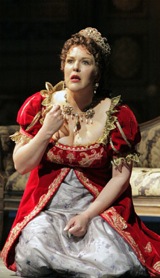
She was San Francisco Opera's Tosca of last summer, and Canadian soprano Adrianne Pieczonka has been getting big roles and good reviews far and wide. In her hometown of Toronto she is getting a warm welcome as in this excerpt from Xtra!:
She is at the top of her game. In addition to releasing her second solo recording, a CD of Puccini arias, this year sees Pieczonka returning to the Met as Sieglinde and reprising her Prima Donna in Ariadne in Munich among numerous other engagements.A recital in Hamilton last November, however, has a unique place as a sort of homecoming in the Burlington-native’s heart. It was with her wife, Canadian mezzo-soprano Laura Tucker.
"It was really special," says Pieczonka. "I grew up in Burlington and my mom was born in Hamilton. Performing with Laura was just terrific and we enjoyed the recital very much. There was a lot of love in the audience — many old friends and family and many of my parents’ friends and family."
The singers met during the Canadian Opera Company's 2004 production of Die Walküre. Pieczonka moved back to Toronto in 2005 and the couple now make their home in the Annex with their three-year-old daughter.
Do they have a favourite duet? "Our daughter is called Grace and we love to sing 'Amazing Grace' as a duet, sometimes a cappella... just the voices and the words. Lovely."
Will 'Traditional Orchestras' Survive?
From Michael Kaiser, president of the John F. Kennedy Center for the Performing Arts, in the Nov. 9 issue of The Huffington Post:
One of the Fellows participating in the Kennedy Center Arts Management Institute raised a serious question with me: Can the traditional model of a symphony orchestra work in the United States?He observed that salaries are very high for musicians, conductors, and guest artists, and ticket demand is not strong enough to cover most of these costs. High ticket prices are stifling that demand and contributions will continue to have to grow very rapidly to cover inflation.
I cannot argue with this analysis. Somehow the cost structure for American orchestras has risen to the point that every orchestra is likely to struggle to make ends meet ...
In many cases, radical restructuring can be avoided if musicians and administrators embark on a reasonable, long-term planning process that addresses marketing strategies, fundraising approaches, and artistic initiatives. In other words, plans for activities that build revenue. But this rarely happens. In fact, the time administrators and musicians communicate most is during union negotiations, when only the cost side of the equation is under consideration.
Without a more enlightened discussion, orchestras are going to continue to fail or to reduce their levels of art and education. I am afraid my Arts Management Institute Fellow may be proven right after all.
